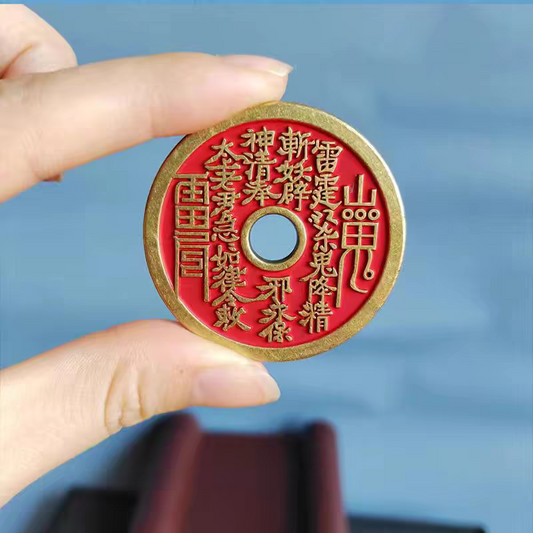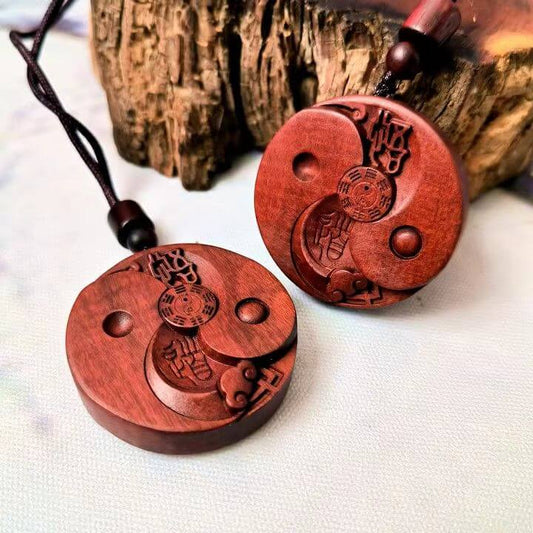
Viewing the Profound Influence of Taoism on Chinese Culture from a Ci-Poem
paulpengShare
Let's take a look at a ci-poem "Wushan Yiduan Yun" written by Liu Yong, a great ci-poet of the Northern Song Dynasty:
"Early in the morning, paying homage to the Golden Mother. At dusk, getting drunk on the jade turtle. The celestial wind sways the six-drhamma garment, feeling lonely and perilous on the crane's back.

Greedy to watch the wild play of the Sea Toad. Unaware that all nine gates of heaven are closed. Where to spend this fine night? Return to visit the Three Maos."
The Golden Mother refers to the Queen Mother of the West. The west belongs to metal in the Five Elements, thus the name. The Queen Mother of the West was first recorded in "Shan Hai Jing". In "The Classic of Western Mountains", it is said: "Jade Mountain is where the Queen Mother of the West resides. The Queen Mother of the West looks like a human, with a leopard's tail, tiger's teeth, and a talent for howling. With unkempt hair and wearing a headdress, she governs the disasters and calamities of heaven." It can be seen that the original Queen Mother of the West was a fierce deity. Later, she transformed magnificently into a graceful goddess and became the leader of female immortals.
According to Taoist scriptures, the Queen Mother of the West "embodies the essence of compliance and gentleness, is the extreme of yin, and her position is in the west. She nurtures all beings. Among all the women who ascend to immortality and attain the Dao, both in heaven and on earth, and in all directions of the three realms, they all belong to her jurisdiction." And there is a Lord of the East to match her. Both the Queen Mother of the West and the Lord of the East were directly 化生 from the most primitive Taoist qi. When immortals ascend to heaven, they first pay homage to the Lord of Wood, and then visit the Golden Mother. After the affairs are completed, they can ascend to the Ninth Heaven. Only after that can they enter the Three Pure Ones, pay homage to the Supreme Laozi, and present themselves to the Primordial Celestial Worthy. It can be seen how high the position of the Queen Mother of the West is.

Immortals have the tradition of riding clouds and cranes. And the six-drhamma garment actually comes from Buddhist scriptures. In Buddhist scriptures, it is said that the clothes in Trayastrimsa Heaven weigh six drhammas. A drhamma is an ancient unit of measurement, one twenty-fourth of an ounce is a drhamma. Six drhammas show the lightness and thinness of the clothes. Swayed by the celestial wind, yet it is also cold at the high place. Even with successful cultivation, one is still addicted to the various affairs of the mortal world.
Therefore, immortals would also be greedy to watch the wild play of the Sea Toad. However, the taste of immortals is very refined. The Sea Toad is not an ordinary person. The full name of the Sea Toad is Liu Haichan. He is a fellow apprentice of Lu Dongbin, one of the Eight Immortals, or some say he is the disciple of Lu Dongbin. Liu Haichan is regarded as one of the Five Patriarchs by the Quanzhen School of Taoism. What is the wild play of the Sea Toad? According to folklore, Liu Haichan plays with the golden toad and catches money step by step. Therefore, Liu Haichan is also the God of Fortune in traditional Chinese culture and is regarded as one of the Nine Gods of Wealth.
Perhaps the play of Liu Haichan with the golden toad was too wonderful, and thus the time to enter the Heavenly Gate was missed. All nine gates of the Heavenly Palace were closed, and they had to return to the human world. Where is the best place in the human world? The most important base for Taoist cultivation still has to be Maoshan.
Maoshan was originally named Juqu Mountain and was renamed because the Three Maos Immortals practiced here for a long time. The Three Maos Immortals are three immortals revered in Taoism: Mao Ying, Mao Gu, and Mao Zhong. They are said to be from the Han Dynasty. The eldest Mao Ying entered Mount Heng at the age of eighteen to learn Taoism and continued to cultivate for twenty years. When he succeeded in cultivation and returned home. At this time, his parents were still alive. Seeing this eldest son, instead of being happy, they were extremely angry and scolded: "You are an unfilial son. You do not care to support your parents but seek after the delusions and wander around!" They picked up the cane to hit him. But the cane immediately broke into dozens of pieces. The parents were startled and only then knew that their son had truly succeeded in cultivation.
Later, Mao Ying bid farewell to his parents and relatives and continued to cultivate in Juqu Mountain. From then on, people near and far did not suffer from floods, droughts, diseases, plagues, or locust disasters. Therefore, people called Juqu Mountain Maoshan. Mao Ying's two younger brothers, Mao Gu and Mao Zhong, abandoned their official positions and families when they were in their seventies and eighties and practiced with their elder brother. Later, they also succeeded in cultivation.
In the ninth year of Chunyou of Emperor Lizong of the Song Dynasty, the eldest Mao Ying was conferred the title of "The Saintly Guardian and Divine Lord of the Supreme Mysterious Tao, the Saintly Lord on Mount Tai and the Minister of Destiny of the Eastern Mountain", the middle Mao Jun was conferred the title of "The Saintly Lord of Immutability and Tranquility, the Virtuous Guardian of the Right Prohibition of the Supreme Tao", and the youngest Mao Jun was conferred the title of "The Saintly Lord of the Three Officials, the Subtle and Gracious Guardian of Life and the Benevolent Guardian". From the titles, it can be seen that the Three Maos Immortals had an extraordinary influence on the common people.
A simple ci-poem contains so much Taoist knowledge. It can be seen the profound influence of Taoism on Chinese culture. If we do not inherit the good traditions, who will?









